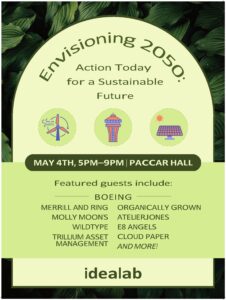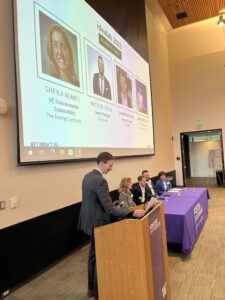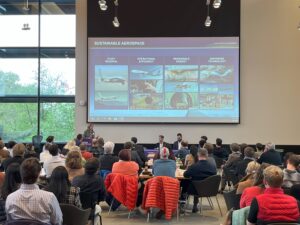Envisioning 2050: Action Today for a Sustainable Future
Net Impact of Foster organized Idea Lab – the annual marquee event of the club which draws in students, professionals, academics, and policymakers to discuss the most pressing issues in sustainability. This year’s theme was Envisioning 2050: Action Today for a Sustainable Future.
Net Impact’s co-presidents Connor Almon-Griffin and Emily Thacher shared their experience organizing Idea Lab.

Tell us about the IdeaLab event this year.
On May 4th, Foster’s Net Impact club hosted nearly 200 students, professionals, and academics in Paccar Hall to discuss some of the most pressing issues at the intersection of business and sustainability. It was a huge team effort to organize the event, though our classmate Sam Plotkin led the charge.
The evening started with an hour of mingling. It was invigorating to see our speakers, classmates, and other professionals meeting and sharing ideas over drinks and appetizers. The mood was energetic and hopeful.
After that, our keynote began. We were grateful to have Sheila Remes, Vice President of Environmental Sustainability at The Boeing Company, as our lead. She introduced Boeing’s own sustainability efforts and the crucial role that sustainable aviation fuel will need to play in decarbonizing aviation in the coming decades, as we work to develop alternatives like hydrogen and electric flight. Sheila then invited industry leaders from Alaska Airlines, Microsoft, and SkyNRG into a roundtable discussion. Their discussion highlighted the importance of partnerships throughout the value chain to make progress in sustainability.
Following the keynote, we hosted breakout panels on Sustainable Finance, the Built Environment, Sustainable Food Systems, and Sustainability in Small Businesses. Each panel was moderated by our very own MBA students and included business leaders and industry experts. These panels were where attendees could dig in to ask speakers specific questions. We heard from many attendees that they found the candid, informal discussions in the panels to be incredibly insightful.

Where did the idea for IdeaLab come from?
IdeaLab has been a huge part of Foster’s chapter of Net Impact for more than a decade. It originally started as a hackathon style of event that brought together MBA candidates, UW undergraduates, and professionals from the Seattle community to discuss major impact-related issues of the time and collaborate on solutions to those issues. Over the years, it has evolved to what we like to call a “mini-conference” that brings together business leaders who are on the forefront of impact-related work, from combating global climate change to social equity and inclusion, to more transparent corporate governance. IdeaLab has become Net Impact’s signature event. We were proud of the sold-out event we held this year and grateful for the opportunity to further the incredible legacy that IdeaLab has become at Foster.
What was the rationale for choosing this year’s IdeaLab theme?
This year’s theme was Envisioning 2050: Action Today for a Sustainable Future. We wanted to focus on actionable ideas business leaders can take today to ensure a more just and sustainable future. Because we wanted to appeal to many of our classmates, we were seeking a theme that was broad enough to encompass numerous industries. We also wanted to complement the need for urgent action with the need for positive visions of the future to motivate us all to keep striving for positive change.
Together, the sessions presented a vision of a much more sustainable future—where flying could be less harmful, where food could be healthier for people and for soil, where buildings could be formed of sustainable mass timber rather than carbon-intensive cement, and where finance and small business drive all this forward. Our speakers also highlighted the stakes and the challenges that lie before us, but they gave us examples of how they’ve succeeded too.

How did you choose the speakers and the panel topics for IdeaLab?
Given the fact that the actions required for a more just and sustainable future span across all industries, we wanted to ensure we had speakers and panels that could speak to a multitude of key areas. We wanted to gather a diverse group of speakers who both reflected the local business community and who were already working towards a sustainable 2050. These are the people most equipped to teach and motivate others on how we can all contribute to forming a better future.
We also wanted to make sure that our speakers and panelists would be able to speak about issues that both students and local professionals cared about, so we invited key student leaders from various Foster clubs to help shape and moderate our panels. The Entrepreneurship and Venture Capital Club, for example, organized the Sustainable Small Business breakout.
What went on behind the scenes to make IdeaLab a reality?
Organizing IdeaLab was an incredible experience that began at the start of the year. Sam Plotkin, VP of IdeaLab immediately started gathering a team of volunteers, moderators, and speakers. We really want to highlight Sam’s excellent leadership of IdeaLab. At the same time, it was truly a team effort. Along with Sam, Writu Kakshapati, Alex Macintosh, and Catherine Sandstrom, Virginia Cupp, Greg Ryan, Ester Allen, and Kai Moncino deserve extra appreciation for their efforts in planning another successful IdeaLab!
And a very extra thank you to Kamryn Kurtzner in the Program Office, who very quickly became an honorary member of the Net Impact IdeaLab team. Without Kamryn’s help, there is no way the event would have been as successful as it was.
Marcel Gremaud, FT 2023 and VP of Net Impact, echoed the sentiments of many attendees of Idea Lab:
“As someone who can occasionally be overwhelmed by our environmental challenges, I felt incredibly energized, optimistic, and grateful to be surrounded by so many people committed to sustainability.”
